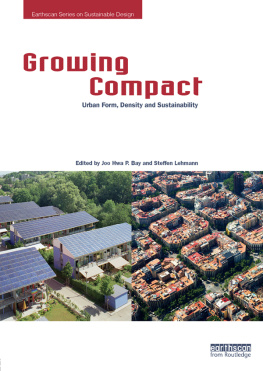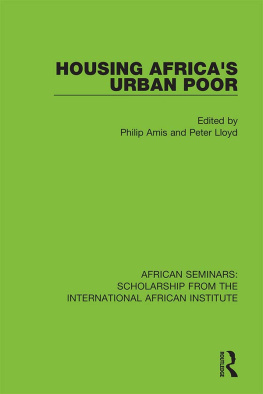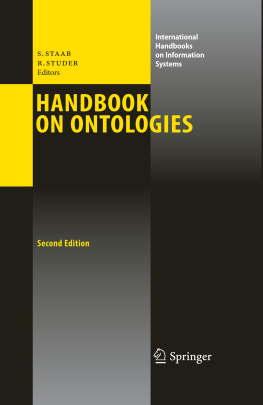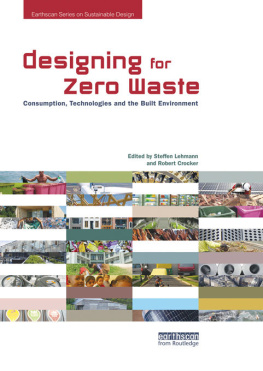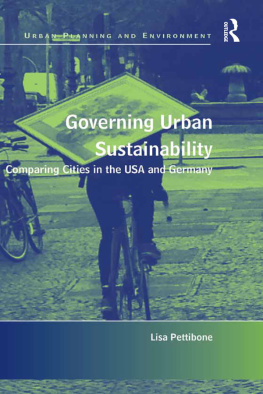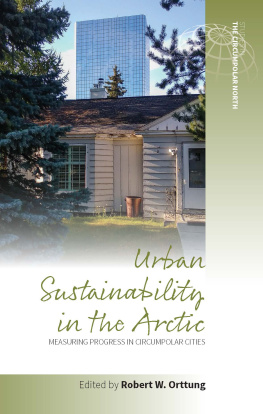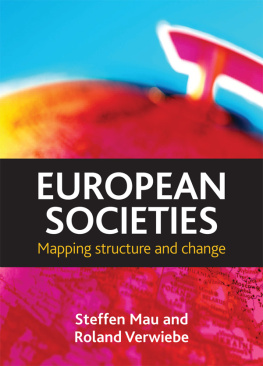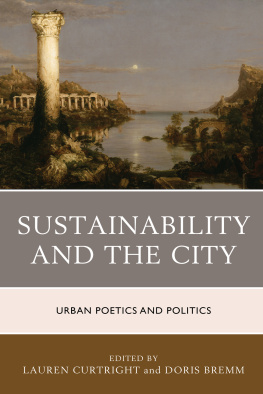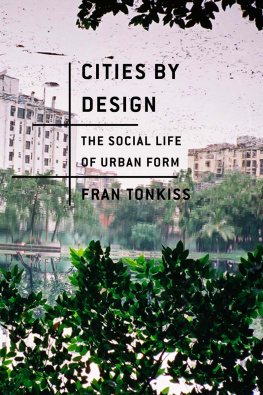Joo Hwa Philip Bay and Steffen Lehmann - Growing Compact: Urban Form, Density and Sustainability
Here you can read online Joo Hwa Philip Bay and Steffen Lehmann - Growing Compact: Urban Form, Density and Sustainability full text of the book (entire story) in english for free. Download pdf and epub, get meaning, cover and reviews about this ebook. year: 2017, publisher: Taylor & Francis Group, genre: Politics. Description of the work, (preface) as well as reviews are available. Best literature library LitArk.com created for fans of good reading and offers a wide selection of genres:
Romance novel
Science fiction
Adventure
Detective
Science
History
Home and family
Prose
Art
Politics
Computer
Non-fiction
Religion
Business
Children
Humor
Choose a favorite category and find really read worthwhile books. Enjoy immersion in the world of imagination, feel the emotions of the characters or learn something new for yourself, make an fascinating discovery.
- Book:Growing Compact: Urban Form, Density and Sustainability
- Author:
- Publisher:Taylor & Francis Group
- Genre:
- Year:2017
- Rating:4 / 5
- Favourites:Add to favourites
- Your mark:
- 80
- 1
- 2
- 3
- 4
- 5
Growing Compact: Urban Form, Density and Sustainability: summary, description and annotation
We offer to read an annotation, description, summary or preface (depends on what the author of the book "Growing Compact: Urban Form, Density and Sustainability" wrote himself). If you haven't found the necessary information about the book — write in the comments, we will try to find it.
Growing Compact: Urban Form, Density and Sustainability — read online for free the complete book (whole text) full work
Below is the text of the book, divided by pages. System saving the place of the last page read, allows you to conveniently read the book "Growing Compact: Urban Form, Density and Sustainability" online for free, without having to search again every time where you left off. Put a bookmark, and you can go to the page where you finished reading at any time.
Font size:
Interval:
Bookmark:

This book uses different prisms to shed new light on the multi-faceted topic of urban density. It contributes to understanding how we can make cities more compact, integrated and connected. It also helps to contextualize the land use efficiency indicator of the sustainable development goals.
Rafael Tuts, Coordinator, Urban Planning and Design, UN-Habitat, Nairobi, Kenya
This book tackles one of the most important challenges that shape future cities: Contextualising urban densities in the face of climate change. The book provides wide discussion; looking at possible urban densities that would guide future configuration of our cities.
Professor Hisham Elkadi, Dean, Built Environment, Salford University, UK
This book puts the ability in sustainability, and the intensity in density towards new forms of resplendent urbanity.
Associate Professor Mitchell Joachim, Terreform ONE and New York University, USA
Each of the chapters in this volume provide lenses to view the challenges of compact and dense cities. How does one build to high density and raise standards of public health and safety and well-being? This book is replete with insights and provocations that set forth a new horizon for urban design research and practice and thus provides a hopeful vision for a resilient future.
Professor Donald Watson, EarthRise Design, USA
Growing Compact: Urban Form, Density and Sustainability explores and unravels the phenomena, links and benefits between density, compactness and the sustainability of cities. It looks at the socioclimatic implications of density and takes a more holistic approach to sustainable urbanism by understanding the correlations between the social, economic and environmental dimensions of the city, and the challenges and opportunities with density. The book presents contributions from internationally well-known scholars, thinkers and practitioners whose theoretical and practical works address city planning, urban and architectural design for density and sustainability at various levels, including challenges in building resilience against climate change and natural disasters, capacity and integration for growth and adaptability, ageing, community and security, vegetation, food production, compact resource systems and regeneration.
Joo Hwa Philip Bay has practised architecture and urban design since the mid-1980s, has been a company director of a large practice, and has designed and completed about half a billion dollars of projects. He was a Council Member of the Singapore Institute of Architects, and has won several design awards. He received his PhD in Technische Universiteit Delft, The Netherlands, researched and taught at the National University of Singapore, and has been an Associate Professor at the University of Western Australia and an Adjunct Associate Professor of the Curtin University Sustainable Policy (CUSP) Institute. One of his design research consultancies was to advise the Singapore JTC Corporation on new urban housing for a 35,000 expatriate population at the new economy hub called one north. His published works include Tropical Sustainable Architecture: Social and Environmental Dimensions, and Towards a Fourth Ecology, in the Journal of Green Building. He founded and chaired the International Network for Tropical Architecture from 2004 to 2009, and has been invited to speak in many international conferences and seminars. He is on the specialist register, LandCorp Western Australia, on editorial boards for two journals, and has been referee and advisor to major conferences, member of jury for design competitions, reviewer of journal papers and examiner of PhD dissertations internationally.
Steffen Lehmann is a Professor of Sustainable Architecture in the Faculty of Creative and Cultural Industries at the University of Portsmouth (UK), where he is also Director of the Cluster for Sustainable Cities, a university-wide research group with 36 researchers. Prior to this, he has been a full professor for 14 years at high-ranking universities in Australia, holding senior leadership positions ranging from Director of research centres to Head of School and Head of Discipline. For most of this time, Steffen was a tenured Chair Professor of Sustainable Design at the University of South Australia in Adelaide, where he was also Founding Director of the Centre for Sustainable Design & Behaviour, and the China-Australia Centre for Sustainable Urban Development. From 2008 to 2010, based on the international significance of his research, he was appointed as chair holder of the UNESCO Chair in Sustainable Urban Development for Asia and the Pacific. Prior to becoming a full-time academic, Steffen ran for over ten years his successful architectural practice Steffen Lehmann Architekten Berlin (s_Lab) in Berlin, where he was instrumental in the design of the New Berlin. After studying at the Architectural Association School in London and completing a PhD at the TU Berlin, he worked from 1990 to 1993 with architects James Stirling in London and Arata Isozaki in Tokyo. See also www.city-futures.org.uk.
Earthscan Series on Sustainable Design
Series Editor: Professor Steffen Lehmann ()
All books in this series are authored and/or edited by leading academics and practitioners in the field of sustainable design and architecture.
While there has been an immense amount of theory and technology focused writing published on the topic of sustainable design, many of these books have failed to introduce readers to the wider challenge of what the re-thinking of design, production, operation and recycling of all products, buildings and cities really means.
Sustainability is not a passing fashion and people are constantly searching for more information, ideas and products in this area. This book series will aim to develop a more coherent theoretical framework for how different theories of sustainable design might engage with the practice of architects, designers, urban planners and related professions. The knowledge gained from this book series will equip the readers with the tools for realising the full potential of the good intentions of sustainable design.
The aim is that these books will provide a novel alignment of interdisciplinary perspectives on the problems of global consumerism, sustainable design and strategies to avoid resource waste, on the scales of products, buildings, districts and cities.
The books will become essential reading for architects, industrial designers, urban designers and researchers/students in these disciplines. Potential readers for the books will also include industry and government agencies. Global relevance and the potential for use as textbooks will be essential.
The book series will become a highly useful addition to the literature on sustainable design, urban development and city culture, focusing on the key topics encountered by students and scholars of urban studies, pointing towards related bibliographic material.
If you have an idea for the series then please contact the series editor.
Designing for Zero Waste: Consumption, Technologies and the Built Environment
Edited by Steffen Lehmann and Robert Crocker
December 2011 | Paperback: 978-1-84971-435-8 | Hardback: 978-1-84971-434-1
Motivating Change: Sustainable Design and Behaviour in the Built Environment
Edited by Robert Crocker and Steffen Lehmann
July 2013 | Paperback: 978-0-415-82978-6 | Hardback: 978-0-415-82977-9
Low Carbon Cities: Transforming Urban Systems
Font size:
Interval:
Bookmark:
Similar books «Growing Compact: Urban Form, Density and Sustainability»
Look at similar books to Growing Compact: Urban Form, Density and Sustainability. We have selected literature similar in name and meaning in the hope of providing readers with more options to find new, interesting, not yet read works.
Discussion, reviews of the book Growing Compact: Urban Form, Density and Sustainability and just readers' own opinions. Leave your comments, write what you think about the work, its meaning or the main characters. Specify what exactly you liked and what you didn't like, and why you think so.

